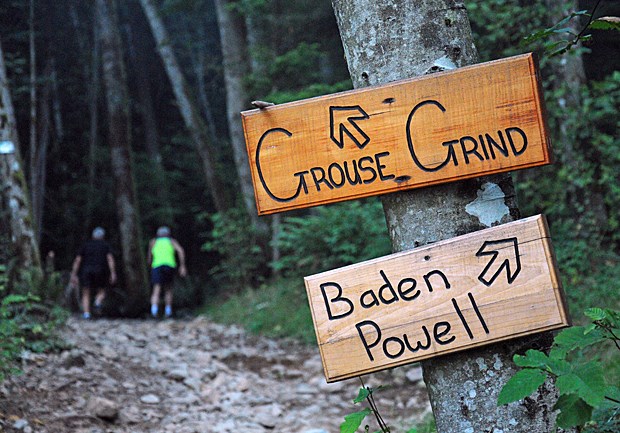Two rock climbers have been fined and banned from entering Grouse Mountain Regional Park for a year after pleading guilty to damaging natural features of the park to create a new climbing route.
In September 2019, Brent Nixon, 45, and Sara Newhook, 31, began work on an unsanctioned trail, cutting down branches and trees, removing mosses and lichens, and drilling anchors into a rocky outcrop in a closed area not far from the top of Grouse Mountain, the court heard at their sentencing on Wednesday (April 21).
When confronted at the scene by a Metro Vancouver park ranger in October of that year, they admitted they were responsible for some of the work, which included 23 trees being cut down and 12 more being limbed. The park ranger also found mosses and lichens scrubbed from the rock face and 14 climbing anchors drilled into the rock, although it was not evident Newhook and Nixon were responsible for all of them.
The damaged trees were between 50 and 126 years old, according to an arborist who inspected them, the court heard.
“The conduct of the accused in this case, we say, was highly culpable,” said prosecutor Shane Hopkins-Utter. “The actions of Nixon and Newhook degraded a sensitive ecosystem on a long-term if not permanent basis, reduced available habitat, diminished habitat quality … for a number of species at risk. It is our submission that it will take a very long time for the area to recover.”
The couple are the first people ever charged with the offence under Metro Vancouver’s Regional Parks Regulation Bylaw, which makes it illegal to cut or damage any natural park features.
Nixon’s lawyer Greg Diamond said that is largely owing to the fact rogue trail building has been largely tolerated in parks and on Crown land for decades.
“What this case may highlight is perhaps an increasing tension between outdoor recreationalists and people using urban centres and parks,” he said, “I think of mountain biking as a particularly strong example where the bikers just go into the woods to start carving up trails in the forest, and this is happening all around our urban centres – both on the North Shore and up the Sea to Sky corridor.”
Nixon has since founded Vancouver Climbers’ Association, which specifically advocates against climbers making any changes to the environment without the landowners’ permission, which should be considered a mitigating factor, Diamond argued.
“This wasn't a wanton disregard for the environment. It was done in the belief that it was a tolerated activity – on parks, Crown land, wherever – in an out-of-the-way spot,” he said. “He was only cutting trees with a mindset of safety. Of course, now it's really hit home … about how mindful he should have been about the effect on the environment.”
As a leader in the relatively small climbing community, Nixon has been left with a “tremendous amount of shame,” Diamond said.
Newhook’s lawyer, Nick Elson, also emphasized his client’s desire to simply making the climbing route safe.
“It’s essentially an altruistic act even though, clearly, it was contrary to the bylaw,” he said. “Certainly, Ms. Newhook has learned from this experience.”
Ultimately, provincial court judge Daniel Weatherly agreed to the joint request by prosecution and defence for a $5,000 fine for Nixon and a $1,500 fine for Newhook for their roles in the damage. They are also banned from entering Grouse Mountain Regional Park for a year.
“It appears that something positive has come out of this and hopefully not just Mr. Nixon and Ms. Newhook, but all of the climbing community can learn from this,” he said.



